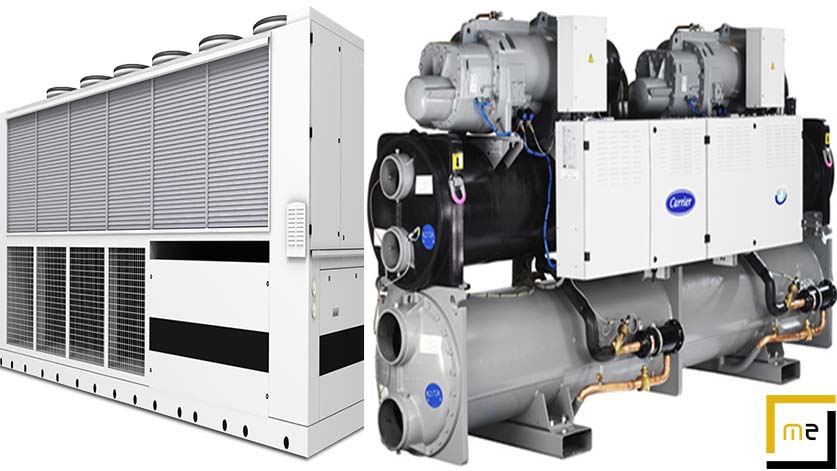
Air-Cooled Or Water-Cooled Chiller?
One of the major difference between Air-cooled and Water-cooled chillers is the Condensing unit which is unique.
Air-Cooled Cost Difference.
By their design and operation, air-cooled chillers appear costlier at face value. To begin with, air-cooled systems will feature installation costs for air ducts, fans and thermoregulation controls. Additionally, these chiller systems consume larger amounts of energy to power the fans that facilitate their cooling effect which will translate into higher electrical bills.Water-Cooled Cost Difference.
Water-cooled chillers cost less to set up, they generally have more long-term operational costs as most of these chiller types will need to have cooling towers installed. Also, after factoring in chiller maintenance expenses like water quality testing, the mandatory treatment of water and refrigeration system operating costs, water-cooled chiller operating costs can rise significantly.- Power up your New cooling system and give us a feedback.
Air Cooled Chiller.
There are distinct differences between the condenser of an air-cooled chiller and a water-cooled chiller. Air-cooled chillers are equipped with condensers that utilize ambient air to reduce refrigerant temperatures. Fans are used to force the air over tubing containing refrigerant and therefore eliminate heat from it. The cooled refrigerant used in chillers can then be circulated through the industrial process to achieve a cooling effect.
Water Cooled Chiller.
Water-cooled chillers take advantage of the high heat capacity of water to facilitate refrigerant chilling. The typical coolant used in water-cooled systems is a mixture of water and glycol which is circulated in a sealed network of tubing. Cooling occurs when the chilled refrigerant is passed through a heat exchanger that interfaces with the industrial process at hand. Warmed coolant is then returned to a cooling tower or refrigeration unit which eliminates acquired heat in preparation for another cycle of cooling.
Cost Differences.
Another important factor to note in the comparison between air-cooled and water-cooled chillers is the cost of purchase, installation, and maintenance.
Environmental/Location Considerations.
The planned location of a chiller unit is another important point to consider when deciding on the choice of an industrial chiller. Depending on site plans, there are pros and cons to opting for either air-cooled or water-cooled chillers.
Indoor Locations.
Both air-cooled and water-cooled chiller variants can be installed in an indoor location. However, additional space considerations must be made for air-cooled chillers. This is because air-cooled chillers require access to enough ambient air to function properly.
Situating an air-cooled chiller in a poorly ventilated indoor space will hamper its cooling abilities and reduce its effiiciency. By comparison, water chillers can be installed in areas with minimal ventilation as their cooling towers can be placed on the building’s exterior.
Outdoor Locations.
Opting for an air-cooled chiller in an outdoor setting is advantageous as there is unlimited access to a high flow of the ambient air required to facilitate coolant chilling. Water-cooled chiller systems are seldom situated in an outdoor location.
Environments with Elevated Temperature.
Water-cooled chillers are the best choice for installation in industrial areas with high thermal outputs. Air-cooled units will perform poorly in areas with elevated temperatures as the chillers and cooling towers will struggle dissipate the heat held within the coolant tubing.
Locations with Poor Water Supply
The choice in situations where there is a poor supply of water is easy. An air-cooled chiller is the best choice in such cases as long as it is installed in an adequately ventilated area. Available water can, therefore, be channelled into other production processes where it is indispensable.
Environmental Regulations.
Local or regional regulations on industrial effluents is a critical issue to address when choosing a chiller system. In this regard, an air-cooled chiller is more advantageous as there is no concern about the release of waste materials into the environment.
Wastewater from open-loop water-cooled chillers will require treatment before release back into natural water bodies which imply additional cost on operators. Fortunately, all of the water-cooled units at Cold Shot Chillers are closed-loop chiller systems which are very environmentally friendly.
Chiller Efficiency Comparisons
By comparison, water-cooled chillers are more efficient than air-cooled variants. Air-cooled chiller efficiency is dependent on the temperature of the ambient air being used in its cooling system. The higher the temperature of the circulating cooling air, the less efficiently an air-cooled chiller will perform.
Overall, more energy will be expended to repeatedly pump air through the heat exchanger to achieve the desired coolant temperatures.
If we didn't answer your question, Please chat with one of our agents or send us an email. Thank You.
REQUEST A QUOTE NOW!

Comparably, water-cooled chiller efficiency is much higher as they operate less dependently of ambient environmental air temperatures. Utilizing water cooling towers or refrigeration units will ensure a steady regulation of chiller fluid within optimal range and therefore industrial processes utilizing these chillers will be cooled appropriately.
Let ME help on Heating & Cooling
Mekanik Elektrik is the leading re source for all things heating, cooling, and indoor air quality online. We offer a variety of free resources to help you understand and best care for your HVAC systems and components. When you need individualized help for your home’s equipment, use our HVAC Contractor Directory to locate a nearby HVAC company to assist.





Comments (2)
Posted by: Admin
19 September, 2019When you need individualized help for your home’s equipment, use our online form, chat or give us a call.
ReplyPosted by: Admin
19 September, 2019Mekanik Elektrik is the leading resource for all things heating, cooling, and indoor air quality online. We offer a variety of free resources to help you understand and best care for your HVAC systems and components.
Reply